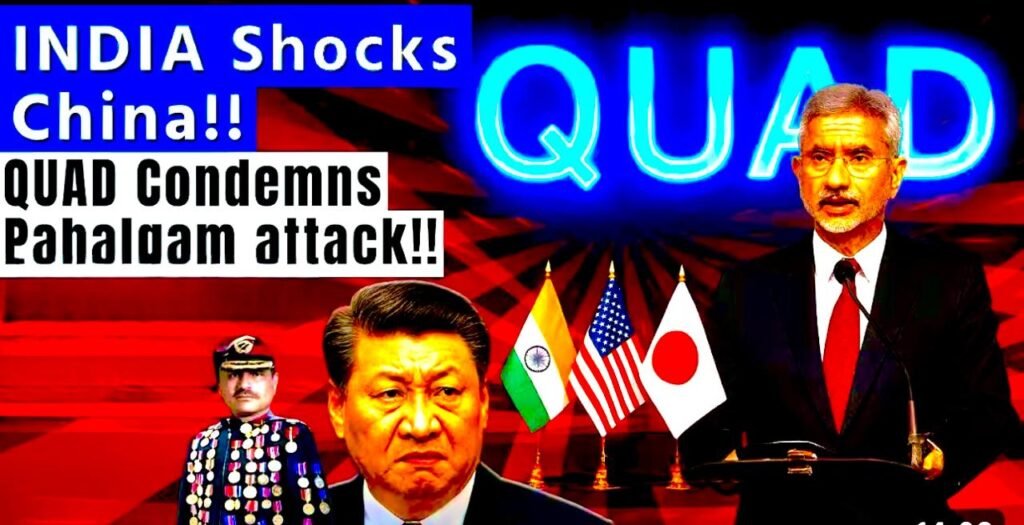
An important Quad summit was held in Washington D.C., USA, where India was represented by Jai Shankar. Foreign ministers from Australia and Japan also attended.
◦
The Quad openly condemned the Pahalgam terrorist attack and called for the perpetrators to be brought to justice, a development seen as a major win for India1.
◦
This collective condemnation from Quad countries sends a very strong message globally that Quad members stand with India. Initially, there was skepticism whether the attack would be explicitly mentioned in the official Quad declaration, with some expecting only individual condemnations.
Contrast with SCO Summit:
•
This Quad development stands in stark contrast to a recent SCO summit in China.
◦
During the SCO summit, China and Pakistan removed the mention of the Pahalgam terrorist attack from the final statement1.
◦
In response, India refused to sign the final statement of the SCO summit.
◦
This led to widespread international media coverage highlighting India’s rejection of the SCO statement, which significantly diminished the perceived unity and relevance of the SCO group.
◦
Jai Shankar later clarified that India refused to sign the SCO declaration because terrorism was not acknowledged1.
◦
It was noted that Pakistan is an SCO member, and the organization is often informally led by China, with China and Pakistan having previously collaborated to protect Pakistani terrorists at the UN. Russia largely remained silent on the issue, and other SCO countries lack significant international stature.
•
India’s Stance on Terrorism and New Policy:
◦
Jai Shankar stated at the Quad summit in the US that the world must adopt a zero-tolerance policy towards terrorism, emphasizing that victims and perpetrators must never be equated.
◦
He asserted that India has every right to defend its people against terrorism and will exercise that right, indicating that India will attack the source of terrorism, wherever it may be, if terrorism occurs against it.
◦
Jai Shankar characterized the Pahalgam attack as a form of “economic warfare,” specifically aimed at destroying Jammu and Kashmir’s tourism sector, which is the main pillar of its economy3.
◦
India openly declared its stance that Pakistan harbors terrorist gangs and infrastructure, and India will no longer spare any government that supports and finances these terrorist organizations.
◦
The video highlights that India is now shifting to a policy of “no impunity,” meaning it will not accept the narrative that terrorists are mere proxies with no state involvement, as it is clear that the Pakistani state supports terrorists4.
◦
Crucially, India will no longer be deterred by “nuclear blackmail,” signaling a complete transformation in its policy, implying India will not be stopped by the nuclear angle in future operations.
•
Emerging Military Angle in Quad:
◦
For the first time, Quad nations have agreed to launch an “at sea observer mission”.
◦
This mission will involve coast guard operations and, to some extent, naval roles, marking the initial inclusion of a “naval angle” or “military angle” within Quad.
◦
This development is seen as sending a message to China regarding its policy of protecting terrorism4.
•
Future of Quad and Concerns:
◦
The speaker states that “Quad is the future”
◦
India is expected to host the Quad summit in 2025, with a high probability of Donald Trump attending.
◦
However, the speaker expresses nervousness about the long-term strength of Quad, not due to potential issues between India and the US, but because of concerns that Donald Trump might damage US-Japan relations.
◦
Trump has reportedly threatened Japan with 35% tariffs and demanded billions of dollars for military protection.
◦
The speaker anticipates a significant decline in US-Japan relations, potentially leading to the breaking of treaties and defense pacts, and even the gradual withdrawal of US soldiers from Japan5. The eventual impact of this on Quad remains to be seen, with developments expected within the next one to two years.
•
Refutation of Donald Trump’s Claims:
◦
Jai Shankar openly refuted Donald Trump’s repeated claims about using trade to achieve an India-Pakistan ceasefire during “Operation Sindoor”3.
◦
Jai Shankar stated that he was “in the room” and that Trump’s phone call never came to PM Modi during that operation3. Instead, a call from JD Vance occurred, which did not involve any discussion about trade3. This open rejection by Jai Shankar of Trump’s claims was widely reported.





